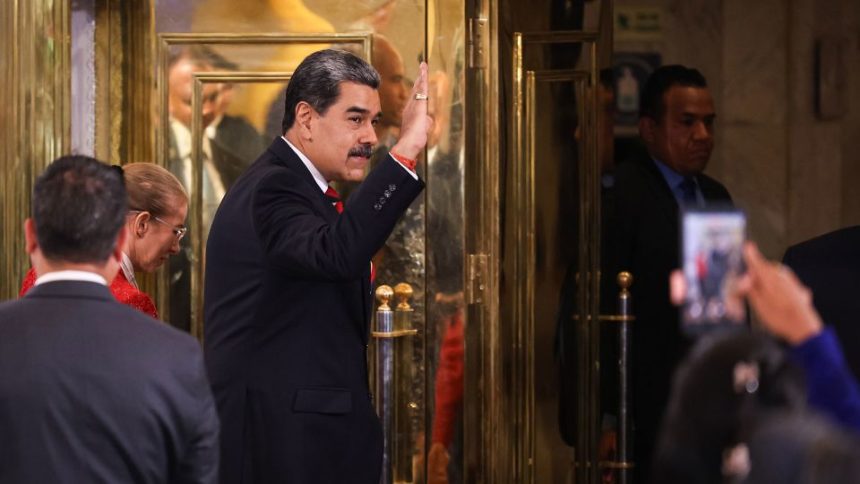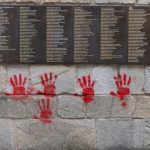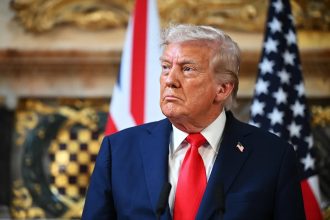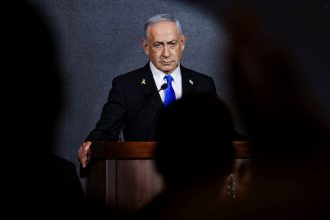In the final year of President Donald Trump’s first administration, the CIA carried out a clandestine cyberattack against the Venezuelan government, disabling the computer network used by Venezuelan leader Nicolás Maduro’s intelligence service.
The attack, described to CNN by four sources familiar with the operation, was perfectly successful.
It was also a throwaway, those sources said — an effort by the CIA to satisfy the president’s ambitions to do something about Venezuela and avoid taking riskier, more direct action against Caracas.
The previously unreported episode was one of a series of moves that national security officials took to placate Trump during his first term in office as he sought to oust Maduro, covert maneuvering that came to deeply frustrate the president and his team as the Venezuelan strong man remained stubbornly in power.
It helps underscore the president’s public determination to take a maximalist approach toward Venezuela in his second term.
Since the summer, the US has amassed a huge military force in the region, including roughly 10,000 troops, with an aircraft carrier now en route from Europe. The president has said in recent weeks that the US is considering direct strikes on Venezuelan territory, and that he has authorized the CIA to conduct covert activity there. A series of what the military termed “attack demonstration” flights off the Venezuelan coast by US bombers last week were an even more visible indicator of the US’ intentions.
Although the administration has characterized the mission for all those military assets as a counternarcotics effort, the size and scope of the buildup has raised the specter of a possible regime-change operation.
Trump during his first term routinely demanded that he be provided military options to pressure Maduro. But White House officials felt that they were given the runaround by Pentagon and intelligence leaders, whom multiple sources described as reluctant to initiate or escalate a conflict with Venezuela. In one meeting at the White House in 2019, a top Pentagon official reportedly banged his fist on the table in frustration after repeated demands from White House officials for more aggressive options.
“In the first Trump administration, he said that all options are on the table,” said Jimmy Story, who was the top US diplomat to Venezuela from 2018 to 2023. “Many of the options are now at the front door.”
The lesson Trump likely took from that earlier era — when a series of officials sought to temper the US policy towards Maduro — was that he would not be stymied this time, said one former senior administration official: “I told these guys I wanted the military option in 2018 and 2019, they didn’t give me one — I want a real one now,” this person said, summing up the president’s thinking.
The White House and CIA did not provide comment for this story ahead of publication when contacted by CNN. Cyber Command declined to comment.
In this handout provided by the U.S. Navy, The From front to back, the USS Gerald R. Ford (CVN 78), Royal Moroccan Navy FREMM multipurpose frigate Mohammed VI (701), and Military Sealift Command fast combat support ship USNS Supply (T-AOE 6), steam in formation while transiting the Strait of Gibraltar, on October 1, 2025. – Alyssa Joy/US Navy/Getty Images
‘Get it done’
Trump first requested military options to remove Maduro from power from his second national security adviser, H.R. McMaster, at a meeting at his golf resort in Bedminster, New Jersey, in 2017, according to a former White House official. He told the assembled press later that day: “I’m not going to rule out a military option for Venezuela.”
He would return to the request more than once, as he pressed subsequent national security advisers to find a way to get rid of the Maduro regime and grew increasingly frustrated that it hadn’t happened.
“Get it done,” Trump told his national security adviser John Bolton in August of 2019, meaning oust Maduro, Bolton wrote in his book. “This is the fifth time I’ve asked for it,” Trump continued.
White House officials began to sense that senior leaders in both the Pentagon and the CIA were resistant to the idea of using force. They weren’t wrong, according to a former senior intelligence official and three former administration officials.
Within the administration, CIA Director Gina Haspel was widely known to be opposed to using agency personnel to carry out covert operations against Maduro, those sources said, and at times resisted suggestions from the White House for proposed action. With pressure building from the White House for covert action, there was a lack of consensus at the CIA and at the Pentagon about what would be effective at pressuring Maduro to leave office. The CIA has a long history of interference in Latin American affairs during the Cold War, including failed regime changes, that has created greater reticence from agency leaders.
In 2019, the administration coalesced around a strategy to offer diplomatic and economic support to the Venezuelan opposition leader Juan Guaido, officially recognizing him as the legitimate leader of Venezuela after a 2018 election victory for Maduro that was decried internationally as rigged. More than 50 countries would eventually recognize Guaido as the country’s head of state.
“The regime was shaky, and we thought that the opposition had a good chance,” one of the former senior administration officials said.
But that effort foundered as it became clear that Guaido had no practical means of actually assuming power in Venezuela. No massive street protests arose, the military remained loyal to Maduro, and, after a failed coup attempt in the spring of 2019, Guaido remained a president without a government to run.
Trump was “pissed,” according to the former White House official. In his mind, Guaido and the opposition “failed him,” that person and others said — but so had his own government, which had effectively backed a losing horse.
Covert action
The president lost his appetite for focusing on Venezuela during the second half of his second term, following the opposition’s failed coup, according to multiple former administration officials. But Trump had also adopted an even more hawkish view of Venezuela.
The desire increased among White House officials for using covert operations and cyberattacks to cause disruptions in Venezuela, and for collecting intelligence on the regime, according to multiple sources familiar with the matter.
Cyber Command, the US military’s offensive and defensive cyber unit, conducted a cyberattack in the latter half of Trump’s first term to interrupt the satellite communications of the Wagner Group, Russian mercenaries who then reportedly had a presence in Venezuela, the sources said.
The US military also considered setting up a special team, staffed with Coast Guard personnel, to focus on hacking drug traffickers and collecting intelligence to support US counter-narcotic efforts, according to the sources. The team would have had a heavy Venezuela focus, but concern about legal authorities and bureaucratic hurdles prevented the idea from turning to action.
Other ideas never got off the ground. An administration official proposed knocking a hydroelectric dam in Venezuela offline with a cyberattack, one of the sources said, but the idea seemed half- baked and never made it to the desk of the Pentagon’s cyber operations planners.
The hope was that aggressive covert action could cause enough discomfort and create sufficient disturbances that the military, which has played a critical role in keeping Maduro in power, would be convinced to switch sides and support the opposition, said the former White House official.
But other officials criticized that strategy as lacking solid planning for the day after, the former White House official said — who added that history appears to be repeating itself
“Opposition doesn’t have a plan. We don’t have a plan,” that person said. “Hope is not a plan.”
There were signs that Trump might soften his approach to Venezuela in his second term, according to Story, the former diplomat. Special envoy Richard Grenell has met several times with Maduro to try to secure the release of US citizens wrongfully detained in the country, for example. But in recent months Trump ordered Grenell to stand down, and officials say the Venezuela portfolio is now largely being driven by Secretary of State Marco Rubio, a Venezuela hawk.
“Then the hawks took over,” Story said, “so now it’s ‘maximum pressure’ to another level.”
He declined to comment on any covert action.
In the midst of the military buildup, the Trump administration has carried out a series of lethal military strikes against small, go-fast boats including some that have left Venezuelan ports. The Defense Department insists they are trafficking drugs, although it has provided no evidence and Venezuela is not a major producer or transit point for drugs into the US.
What the administration’s end game is remains unclear. Some, like Story, say that they would be “very surprised” if the US ships in the Caribbean were not “deployed in some way” against the Venezuelan government.
“It’s not a force capable of invading the country, but it could potentially be a force capable of doing highly sophisticated rendition of senior leadership in the country,” Story told CNN.
But Trump, who rose to power in part through his criticism of the wars in Iraq and Afghanistan, is also keenly aware of the political risks of backtracking on his noninterventionist bona fides. In the end, the former White House official said, the famously mercurial president could find any number of ways to declare “victory” in Venezuela.
“This is wag the dog,” this person said, “This is anything you want it to be.”
For more CNN news and newsletters create an account at CNN.com









